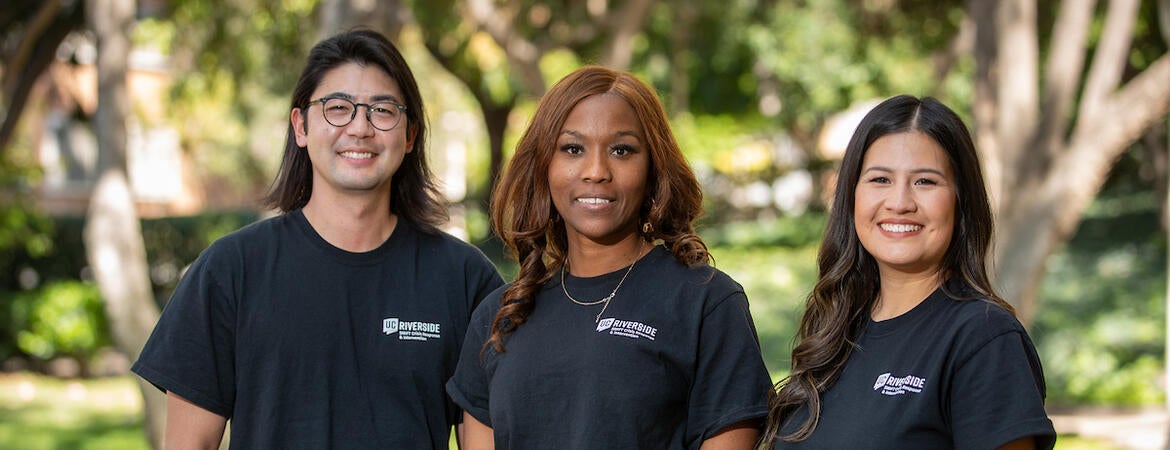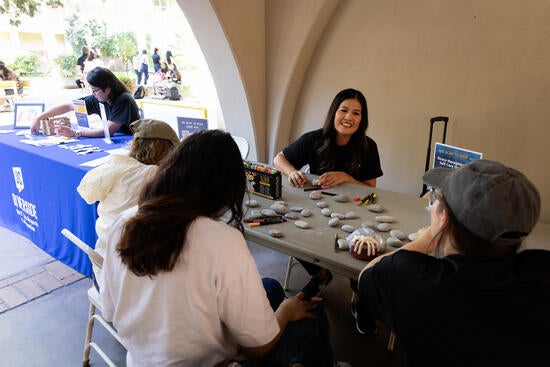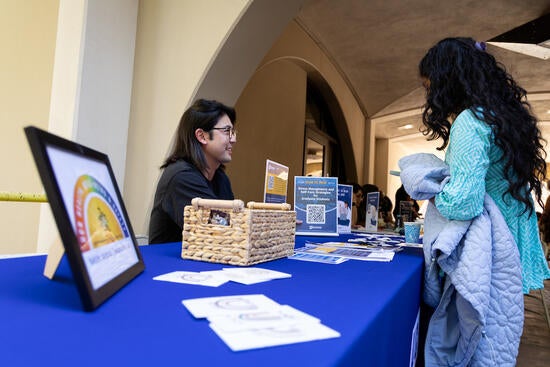For UC Riverside students experiencing a mental health crisis, help now comes to them thanks to a new mobile crisis and intervention team on campus.
The Student Well-being, Intervention and Follow-up Team, or SWIFT, made up of three behavioral and mental health professionals, is often the first to respond to calls where a student is in crisis. A crisis consultant is also available via phone to assist a student in need or advise those assisting someone.
The Health, Well-being, and Safety division introduced the program in April 2024, completing what the team called a "learning year" before fully launching last month.
It’s part of a different approach to campus safety that began when UCR created the Health, Well-being, and Safety division in 2021, bringing together police, counseling, health, and other related services under one umbrella to coordinate them in a comprehensive way.
Two years ago, UCR police added a new team of campus safety responders, consisting of non-sworn, unarmed safety professionals focusing on non-emergency safety issues who serve as liaisons to the campus.
SWIFT is the latest piece in the tiered approach to safety as the campus no longer sends police officers to every call, instead sending professionals best suited for the situation. Police will either direct calls to SWIFT or the team responds to calls from its own helpline.
SWIFT aims to support students in distress in a manner that deescalates the situation, said Ginger Wilkerson, SWIFT director. Wilkerson has in the past been a mental health specialist/director for a community based organization and was for several years a licensed marriage and family therapist.
“We call it decriminalizing mental health,” Wilkerson said. “It’s an opportunity to support students who are experiencing mental health crises. That's what we do.”
She and the other two team members, Jessica Manio and Michael Yamane, are all licensed clinicians with experience in areas including social work and counseling. The team also includes a well-being liaison and an administrative assistant who provide support.
The types of calls to which they have been deployed vary from students overwhelmed by stress to those experiencing suicidal thoughts. Accompanied by a campus safety responder or another campus partner, SWIFT clinicians talk to the student and assess what type of care is needed.
“One of the key things is we’re mobile,” Wilkerson said. “We come to the students wherever they are on campus.”
UCR is among only a handful of UC campuses with such a program.
In an almost 20-year career, Manio has worked in child protective services, youth and foster care, and medical social work. She said it’s been exciting and rewarding to now work with young adults, providing them with emotional support at a vulnerable time in their lives.
“It really is about meeting people where they’re at, treating them with dignity and respect no matter their background, presentation, or circumstances,” she said. “It’s about approaching them with compassion, empathy and a listening ear without judgment.”
In addition to immediate counseling support, the clinicians follow up with wellness checks, ongoing treatment, and connecting the student to other campus resources such as Counseling and Psychological Services, or CAPS.
In extreme cases, where a student is a danger to themselves or others, they may be hospitalized. The team has a van that can provide transportation.
The UCR police department will still respond to situations if there is a safety threat. But in non-threatening situations, a licensed clinician is much better suited to help with mental and behavioral help crises than law enforcement, said UCR police Lt. Jason Day.
“It’s been just magnificent to have a much more positive outcome on our student population and the outcomes for certain calls,” Day said. “As officers going in, you have a limited set of tools and you have to use those to the best of your ability and do what you can. But with SWIFT being here, the scope of tools and the ability and the range of help that we can provide as an institution has just been vastly expanded and we’ve been nothing but big fans.”
In addition to police, SWIFT has been working closely with Residential Education, holding regular workshops and drop-in hours at student residence halls and campus apartments.
Karlie Baker, a resident director at Glen Mor, said SWIFT’s awareness and prevention programs have had a tremendous response, with a recent meeting attended by 50 student residents. They’ve established regular weekly sessions where students feel safe to ask questions or, if needed, talk one-on-one with the clinician, she said.
“We see a variety of students come in and talk to us for a lot of things, anywhere from roommate conflicts that can be stressful to family incidents that can be stressful to suicidal ideation to just struggling with mental health,” she said. “Knowing SWIFT is available and they can talk to somebody right now when they need to is a really great option.”
Manio said an important part of the outreach is helping students recognize signs of distress in their friends. At a recent workshop on reducing the stigma of mental health, students asked how they can help a friend who may be struggling.
“They feel very reassured knowing how to help their friends who may be struggling with their mental health,” she said.
SWIFT has spent much of the first year introducing the program to students and campus partners who support students, Wilkerson said. She said they’re encouraged by the response and looking forward to developing more resources, such as working with faculty and staff to provide them the tools to assist students in distress.
“We’re meeting the need,” she said. ““We’re building trust with our partners, we’re consistently there and we put the student first.”
Learn more about SWIFT here.
Header image: Members of the SWIFT (Student Well-being, Intervention, and Follow-up Team) from left, Michael Yamane, Ginger Wilkerson, and Jessica Manio. (UCR/Stan Lim)






